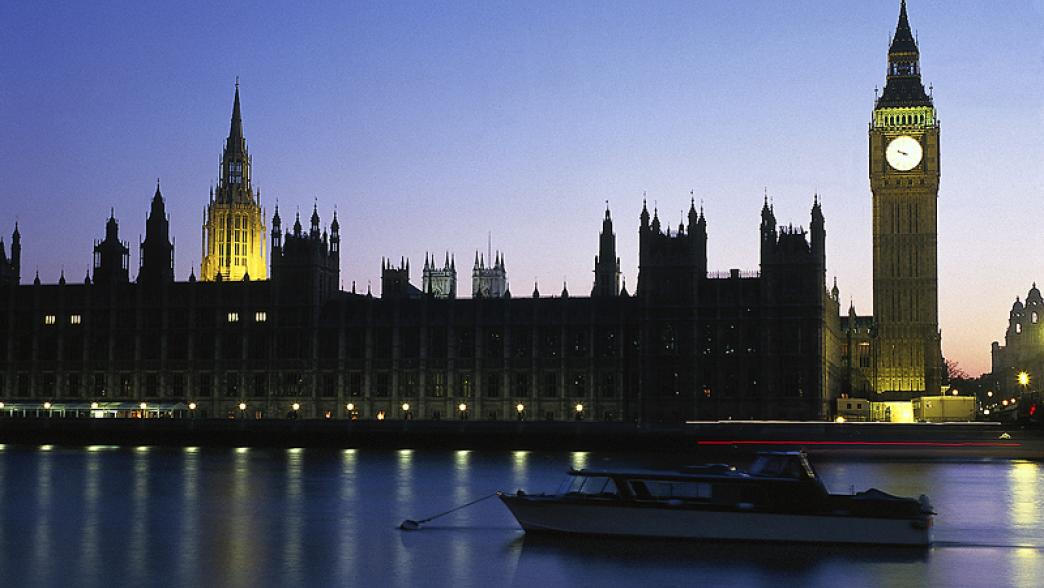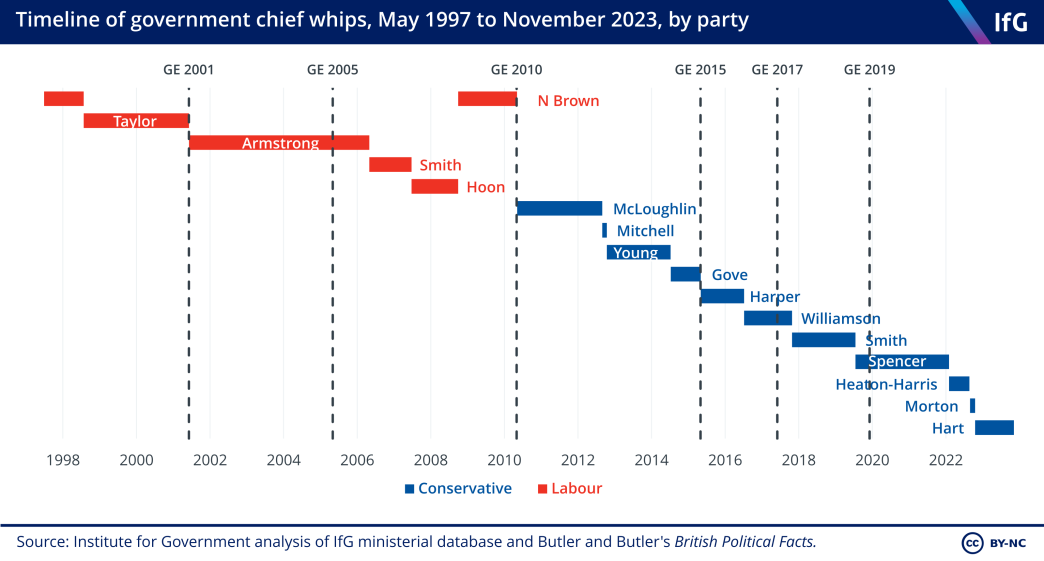Whips: what is their role?
Whips are MPs and peers affiliated to a political party appointed to ensure their party colleagues vote according to the leader’s agenda.

Who are ‘the whips’?
Whips are MPs and peers affiliated to a political party appointed to ensure their party colleagues vote according to the leader’s agenda. There are currently 24 whips in government: 16 in the House of Commons and eight in in the House of Lords. Simon Hart is the current chief whip in the Commons and Baroness Williams is the Lords chief whip. Labour has 12 whips in the Commons and 14 in the Lords, led by Alan Campbell and Lord Kennedy respectively.

What do whips do?
Whips act as a link between the front and back benches. They ensure not only that MPs support party policy but in turn that backbench concerns are communicated to the party leadership – a role that former deputy chief whip Anne Milton likened to a ‘cross between a management lackey and a union shop steward’. In particular, the chief whip advises the cabinet (or shadow cabinet) about how likely legislation is to pass.
Whips also play a key role in organising parliamentary business, distributing information to parliamentarians and allocating their party’s membership of committees. Patrick McLoughlin described whips as being the ‘stage managers’ of the Commons, ensuring that debates are filled and committees attended. Whips of different parties communicate with one another regularly through a process known as the ‘usual channels’. As part of this process whips organise ‘pairing' arrangements, which allow MPs to be absent from a vote by matching them with an absent opposition MP, thereby effectively ‘cancelling out’ each other’s vote.
Supporters of the whipping system argue that by securing the passage of government business through parliament, whips ensure that the government delivers on its democratic mandate. Former Labour chief whip Hilary Armstrong described how she ‘had the responsibility to actually make sure the manifesto was being fulfilled. I had to go in and say to the prime minister, “there are these items left in the manifesto that we haven’t touched yet, and you’ve only got two years to go”.’
How do Lords whips differ from other whips?
The role of whips differs in the House of Lords, where party discipline is enforced less strictly. Lords whips, for instance, do not maintain a system of pairing. They also take a far more active role in proceedings, answering questions, responding to debates and taking legislation through the upper chamber. In this regard, they perform a similar function to ministers in the Commons. This duty is particularly important where there is no departmental minister in the Lords or where there is too large a volume of business for a single departmental minister to handle. Baroness Anelay has spoken of the particular frustrations of being a whip in the Lords, working across several departments without adequate support from the civil service.
How do whips keep their party in line?
Whips employ various tools to ensure their MPs toe the party line. They are known to influence frontbench appointments, using this in exchange for loyalty. 19 Walpole J and Kelly R, The Whip’s Office, SN/PC/02829, House of Commons Library, 10 October 2008 Hilary Armstrong told the Institute that whips are closely involved in government reshuffles and that it was her job ‘to say how they [MPs] performed in the chamber and in committees’. Whips can also allocate offices in the parliamentary estate and again use this to reward loyal MPs.
Whips may also resort to more underhand approaches. Some, like the political commentator Philip Cowley, have claimed that Conservative whips used to keep a ‘black book’ containing details of the private lives of party representatives to use as leverage. 20 Cowley P, ‘Whips 16, Rebels 197’, revolts.co.uk (2004), p. 2 Whips have been accused of both bullying and blackmail. Jack Straw recalled being thrown against a wall by Labour whip Walter Harrison following his election in 1979. 21 Whale S, ‘The unusual channels - how to whip MPs in the age of coronavirus’, The House Magazine, 30 June 2020, www.politicshome.com/thehouse/article/the-unusual-channels-how-to-whip-mps-in-the-age-of-coronavirus More recently, William Wragg accused whips of threatening to withdraw investments from the constituencies of fellow Conservative MPs seeking to oust Boris Johnson as party leader in January 2022. 22 Walker P and Elgot J, ‘Tory defector says whips told him to back PM or lose school funds’, The Guardian, 20 January 2022, www.theguardian.com/politics/2022/jan/20/ministers-attempting-blackmail-colleagues-who-might-oppose-pm-alleges-tory-mp-william-wragg-boris-johnson
This reputation is at least partially the result of careful cultivation by successive generations of whips. Gavin Williamson, a former Conservative chief whip, famously kept a pet tarantula, Cronus, to bolster this image. 23 Tory chief whip won't remove pet spider from office’, The Guardian, 23 November 2016, www.theguardian.com/politics/2016/nov/23/the-tarantula-stays-tory-chief-whip-wont-remove-pet-spider-from-office-gavin-williamson But others who have left the whips’ offices in more recent years often stress that whipping no longer functions in that way. Anne Milton argued that ‘the reputation of the Whips’ Office has persisted for decades, beyond a time when it [actually involved] … grabbing people by the balls and all the rest of it’.
What is 'the whip'?
The ‘whip’ is a written instruction issued by a party to their MPs detailing how they are expected to vote. These are usually issued for every day the Commons is sitting. Whips are not publicly released and there is sometimes uncertainty over how MPs have been instructed to vote. The whip is also issued in the House of Lords, although party discipline is less strictly enforced among peers.
The importance of the vote is indicated by the number of times it is underlined: a one-line whip means MPs are ‘requested’ but not required to attend the vote; the (rarely used) two-line whip signifies that attendance is ‘necessary’ and MPs must request permission to miss it; a three-line whip is an explicit instruction to MPs that their attendance is ‘essential’ and permission to miss such a vote would rarely be granted.
Government whips may also choose to declare a particular vote to be a vote of confidence in the government. By implication, this would mean that the loss of the vote would lead to the resignation of the government. Usually, this tactic is used to exert further pressure on government MPs.
Disobeying the whip – in particular a three-line whip – can limit an MP’s chances of promotion, see them be selected for unpopular parliamentary duties or potentially even be expelled from the parliamentary party altogether (to ‘have the whip removed’).
Parties sometimes choose not to set a whip on a particular issue. This is called a ‘free vote’ and is one of the few occasions when frontbenchers – usually bound to support the same position by the convention of collective responsibility – can express an independent opinion. Traditionally, free votes have been held on matters of conscience, such as fox hunting and assisted dying, when it is accepted that MPs of the same party may have different views.
What does it mean to 'remove the whip'?
When a party removes the whip from an MP, the member ceases to represent their party and sits instead as an independent MP.
This usually occurs for one of two reasons: where an MP breaks a three-line whip or where they are accused of serious misconduct. For instance, 21 Conservative MPs had the whip withdrawn in September 2019 after they voted in favour of allowing parliamentary time for the consideration of the Benn Act, which would have prevented a no-deal Brexit. Of the 18 MPs currently sitting as independents, 11 had the whip removed following allegations of bullying, harassment or sexual misconduct.
The whip may be restored to an MP at any time. Where allegations of misconduct have been made, an investigation may be held before the whip is restored, but this is not a formal requirement. Controversially, Theresa May restored the whip to two such suspended MPs – Andrew Griffiths and Charlie Elphicke – before a vote of confidence in her leadership. 24 Syal R, ‘Tories reinstate MPs suspended over sex allegations for confidence vote’, The Guardian, 12 December 2018, www.theguardian.com/politics/2018/dec/12/tory-mps-suspended-over-sex-allegations-reinstated-for-confidence-vote
- Keywords
- Select committees
- Position
- Whips
- Department
- Whips' Office
- Publisher
- Institute for Government